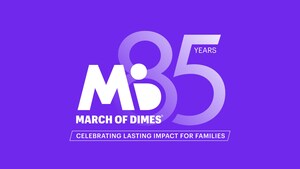Zika Virus Reported in Pregnant Women in 44 States
March of Dimes urges: Take steps to prevent infection
WHITE PLAINS, N.Y., April 4, 2017 /PRNewswire-USNewswire/ -- A new government report shows that nearly 1,300 pregnancies from 44 states with possible recent Zika virus infection were reported to the U.S. Zika Pregnancy Registry in 2016. Most of the women acquired the virus during travel to Zika-affected areas, the report says.
Among the pregnant women with confirmed Zika infection, 1 in 10 had a fetus or baby with birth defects. The highest risk was from confirmed infection in the first trimester -- birth defects were reported in 15 percent of these fetuses or infants.
The report, published today in the journal Morbidity & Mortality Weekly Report (MMWR) from the Centers for Disease Control and Prevention (CDC), includes data on completed pregnancies in the 50 states and the District of Columbia with laboratory evidence of possible recent Zika virus infection reported to the U.S. Zika Pregnancy Registry from January 15 to December 27, 2016.
"Zika virus is causing a lot of anxiety among my patients and their partners, who are accustomed to traveling for work or to visit family," says Siobhan Dolan, MD, MPH, an obstetrician-gynecologist at Montefiore Medical Center in the Bronx and medical advisor to the March of Dimes. "I advise them that preventing infection is the most important thing for themselves and their babies. Protect yourself from Zika before and during pregnancy, and that includes avoiding travel to affected areas. But remember -- it's not forever. Yes, you may miss a family event now, while you're pregnant. But after the baby is born, in a few months, you'll be able to travel safely and with peace of mind."
The March of Dimes coordinates with the Centers for Disease Control & Prevention to provide up-to-the-minute information in English and Spanish for women, men, and families at ZAPzika.org and nacersano.org/zika. The March of Dimes also answers questions about Zika virus in social media and via email in both English and Spanish. Send email to [email protected] or [email protected].
"We don't yet know the full range of disabilities in babies infected with Zika virus," says Dr. Dolan. "Even babies who don't have obvious signs of birth defects still may be affected. Babies born to women who have evidence of Zika virus during pregnancy need brain imaging and other testing after birth to make a correct diagnosis, and to help us understand how these babies grow and develop."
She noted that the March of Dimes is hosting and promoting "Zika Care Connect," a new website that will launch this month to assist Zika-affected families in finding healthcare professionals around the country who can provide specialized care.
Other March of Dimes activities to protect babies from Zika virus include:
- Funding research into a "weak spot" in the structure of a Zika virus protein that may lead to development of the first drug treatment for Zika infection;
- Providing continuing education for nurses on "What Every Nurse Should Know" about Zika in both English and Spanish;
- Preparing Zika Prevention Kits for newborns in Puerto Rico (including mosquito netting, onesies and prevention tips).
Zika virus infection during pregnancy can cause damage to the brain, microcephaly (smaller than expected head) and congenital Zika syndrome, a pattern of conditions in the baby that includes brain abnormalities, eye defects, hearing loss, and limb defects. Zika infection during pregnancy also has been linked to miscarriage and stillbirth.
"Vital Signs: Update on Zika Virus-Associated Birth Defects and Evaluation of All U.S. Infants with Congenital Zika Virus Exposure -- U.S. Zika Pregnancy Registry, 2016" was an early release in MMWR, Vol. 66, April 4, 2017.
The March of Dimes is the leading nonprofit organization for pregnancy and baby health. For more than 75 years, moms and babies have benefited from March of Dimes research, education, vaccines, and breakthroughs. For the latest resources and health information, visit our websites marchofdimes.org and nacersano.org. For detailed national, state and local perinatal statistics, visit peristats.org. You can also find us on Facebook or follow us on Instagram and Twitter.
SOURCE March of Dimes
Related Links
WANT YOUR COMPANY'S NEWS FEATURED ON PRNEWSWIRE.COM?
Newsrooms &
Influencers
Digital Media
Outlets
Journalists
Opted In





Share this article